- Home
- Elizabeth Bear
Undertow Page 3
Undertow Read online
Page 3
“Delighted to meet you, Officer Spencer.” He looked a bit like a boiled fruit: his eyebrows made pale swipes in the redness of his face. Lucienne pointed to his feet. “There’s tea inside, or I can bring you a lemonade on the porch.”
After trading one quick look—backed, no doubt, by connex—Officer Kountché finished pulling his shoes off and powered down. Officer Spencer opted for the hospitality of the front stoop, and Jean brought him a lemonade while Lucienne led the other one inside. When Jean returned to the living room—the kitchen was more an alcove off the side than a separate space—Cricket had taken herself back out to the garden and Officer Kountché was perched uncomfortably on the edge of a wicker slouch chair, maintaining a stiff spine as if in defiance of the urgings of the household goods. Lucienne had turned the burner back on under Cricket’s teakettle, and was measuring leaves into a pot. “Whatever questions you wanted to ask me,” she said, “you can ask in front of Jean.”
The officer looked uncomfortable, but folded his hands over his knee. “Where were you last night, M~ Spivak?”
“Please. Call me Lucienne.”
“You don’t stand on ceremony?”
“I don’t stand on much,” she answered. “Occasionally, my principles. Sugar, Officer?”
“Sugar, please. And answer the question. Please.”
Lucienne frowned, as if measuring spoonfuls of white crystals into the cup was an unwonted effort. “I was here.”
“You can confirm?”
She shrugged. “No connex,” she said. “I live here. I wasn’t anywhere else.”
Officer Kountché glanced at Jean, who leaned, arms folded, beside the door. “I’ll testify to that,” Jean answered.
“M~ Kroc,” the officer asked, “what’s your means of support?”
“I’m a prospector,” Jean answered. “And I consult.”
“No work in the, ah, service industry?”
Jean just smiled. “Not what I would call it, no. Does that have any bearing on your investigation of my partner?”
“Now, M~ Kroc,” Kountché said, apparently having recovered himself, “I’m sure I never said your partner was under investigation.”
The smile Lucienne gave Kountché was almost as plastic as the one she got back. “Jean,” she said, “there’s nothing here you need to defend me from.”
He unfolded his arms and said nothing. She turned back to face the counter and poured the tea. She served him and offered a cup to Jean, who waved it away with the back of his hand, then poured for herself. A delaying action, and a few moments later she ensconced herself across from him, her mug cradled between her hands. “So,” the officer said, “you can’t prove where you were last night?”
Whatever floated in the depths of her tea must have been extraordinarily interesting. She dipped a finger into the steaming surface and bit the resulting droplet from the tip. “Can you prove I was somewhere else?”
“What’s your relationship with the ELF?”
“The Extee Lib Foundation? I give them money. I volunteer in the front office. It’s a perfectly legal and registered charity. Officer.”
“Blowing up a native worker recruitment station is a charitable function?”
“Is that what exploded last night?” Lucienne leaned forward, between her knees, to set her cup down on the plascrete not far from the edge of the braided rug. “You think I had something to do with that?”
“I’m not suggesting any such thing.” He sipped his tea. If he was a hunting dog, Jean thought, his ears would be pricked up. “Do you know anything about it?”
“No connex, remember?”
He shook his head, as if it was a little hard for him to understand the implications. No instant news, no instant messages. No instantaneous communication with people on other planets, halfway across the galaxy.
No constant hum of commercials in the back of your brain. No hacked perceptions, showing you a woman in a red dress and heels when she was wearing a pantsuit and thongs, and weighed fifteen pounds worth of muscle less than the image projected into your brain.
No connex. Alone with the silence inside your own brain.
Not too long ago, of course, it would have been alien to Lucienne, too. But she’d adapted, as Jean had expected she would. If nothing else, it gave you time to think.
“You’ll answer questions under a lie sensor, if necessary?”
Lucienne smiled. “If you subpoena my cooperation. I know my rights, Officer.”
The answering tip of his head was tight. “Are you certain you don’t wish to call your solicitor now?”
“Why should I?” she said. “I’ve nothing to hide.”
2
JEAN LIKED THAT CRICKET STAYED ON AFTER THE RIMMERS departed, all three together. The one who’d waited on the stoop had left his untouched lemonade on the corner of the plascrete, all the ice melted and condensation rolling down the sides.
“As if you’d poison a Rimmer,” Lucienne said disdainfully, while Cricket was bringing the remains of dinner out to her beloved compost pile. Lucienne dumped the glass in the sink and scrubbed it out by hand. She racked it and dried her hands on a towel, while Jean pressed his palms to her shoulders to feel her muscles slide. She leaned on the touch, letting him support her.
“He bugged the chair,” Jean murmured against the black hawser of her braid. “Want to give him an earful after your friend leaves?”
She tossed the towel across the edge of the sink. “As if you haven’t already disabled it.”
He couldn’t shrug and rub her shoulders at the same time, so he settled for a kiss on the nape of her neck. Still brown, this skin, but paler, and vulnerable-seeming, nonetheless. “He can’t prove a thing. Breathe out.”
She obeyed, and breathed in, too, then repeated the process more slowly, with concentrated care. “If he could, he’d have us both in custody. It might be time to step back for a bit. We’re not outraged doomsayers, and I refuse to be herded. Either by Rimmer visits, or by Closs’s threats to assay settled wetlands for mining potential, and hang the treaty. We’re not doing the froggies any good if we wind up inmates at a seaweed farm.”
“We’re not doing ourselves any good either.” He stepped back and let his hands fall away. “There’s always legal challenges.”
“If we could afford better lawyers.”
He nibbled his thumb, turning away from the window, through which the setting sun glared, flashing off spectacles that always drew a double-take when he was introduced to someone new. “I’ll see what I can do. About Cricket—”
“Yes. We can trust her.”
He licked his lips, put his shadow between them so he could see her expression when she turned. The line between her eyebrows was deeper, but the curl of her lips was wry.
“She doesn’t want to be a part of our revolution, Luce,” he said.
“But where she goes, Deschênes follows.”
He didn’t have a ready answer, so Lucienne continued, shading her eyes so she could look straight at him. “I’ll take her to see the ranids tonight. If that doesn’t shift her, nothing will.”
André walked home two hours later than he usually did. The traffic in the streets had fallen off; his meeting had stretched through the afternoon rush. A face-to-face meeting. One of the reasons André kept office hours—kept an office at all—was that his business wasn’t always best handled via connex.
Cricket still hadn’t answered his call about Jean Kroc, which was for the best. He’d have more work for her if she did call. Cricket charged high, even as archinformists went, but she was worth every demark. And if she didn’t call, André would just have to get a head start on the information himself. Because his meeting had been with Timothy Closs, a Rim Company VP who reported directly to Jefferson Greene, the titular head of the Greene’s World Charter Trade Corporation.
And Charter Trade had contacted André because it was looking for a speedy resolution.
André wasn’t a nice man, and he didn’
t do a nice job. But he also understood that it wasn’t that different from jobs that had been necessary, spurned, and not very nice since the first web-footed amphibian crawled from the primal ooze and set up shop to sell dirt to other amphibians from farther downriver. It was a living, and he didn’t play politics, and he didn’t execute grudges. He stuck to what passed for the ethical rules of his profession, and Charter Trade left him alone except for when it needed him.
And on Colonial Charter steadings like Greene’s World, the Rimmers were the law—and had been for the last 250 years, since A.G. 75 or so, though Greene’s World itself was not that old. And the only court of appeals was the Earth-centered, teeming worlds of the Core. Which relied on trade from the ever-expanding halo of the Rim to keep it fed and housed and enjoying an increasing standard of living. A lot of people came to the Rim because they couldn’t live in the Core anymore, for one reason or another.
Frontiers had always been a sort of social pressure valve.
Really, in the end, André just saved Charter Trade the money it would have spent documenting a kangaroo trial. And as for the family of the accused, he saved them some embarrassment.
The sort of people he needed to talk to tonight didn’t do business over connex either. They also weren’t the sort to hang out in pool halls, Italian restaurants, or drinking establishments, adding a little stereotypical color to the place. But Nouel Huc did have an affection for a particular raucous dinner theater on Seagrove—West Seagrove, a much more upscale neighborhood than André’s. Not that that would be a problem, since André was dressed for the office.
He strolled past tall, white-faced, balconied cruisers that smiled around their storm shutters. The air was cooling as the red sun sank, the breeze lifting the day’s last sweat from his neck. The barges here were more solidly lashed, partially because people took more trouble with it and partially because Bayside was the windward edge of Novo Haven, and caught the storms blowing in off the gulf, most of which were not nearly bad enough to scatter the city for. But they could pitch and rub the barges, and the worst damage didn’t come from the wind, under those circumstances, but from the hulls crushing the sidewalks. Bumpers and braces could only do so much.
The awnings were rolled in for afternoon, letting the last light of day reach the blue and green and goldenrod doors, filter in the parlor windows. If André hadn’t known where he was going, he could have picked out the Zheleznyj Tigr from the residences on either side. It was on the 8100 barge, and the velvet ropes leading to the door set it apart, as did the attendant standing by. She was shapely and very pale, her white-blond hair clubbed at the nape of her neck, and she wore a red velvet tailcoat and a tall black hat. She smiled at André as she opened the door, plated heels clicking cheerfully. He answered her crisp bow with a playful one of his own, just to see her pale skin blush.
She must spend a fortune on sunblock.
Inside, candles and wall sconces flickered, dusting dark wood and more red velvet with erratic light. Somebody was playing a neono, not loudly enough to be heard in the street. Not yet. André cocked his head at the music and glanced slowly around. Empty booths, a few occupied, the glossy tabletops mostly innocent yet of glasses.
Nouel Huc sat alone. That was by no means uncommon, but neither was it de rigueur. He was a broad Asian-looking man whose frown lines made him seem brooding, and a little cruel, though he was neither of those things. Women, André imagined, found the contrast irresistible.
It couldn’t have been Nouel’s looks.
André made some noise coming up, though Nouel certainly expected him; he’d IMed a query before he left his office, and gotten the nod to come down. Nouel was tangled up with a woman who lived on Yap, and sometimes when he seemed to be alone, he was actually quite distracted.
But this time, Nouel pushed the chair opposite out with his foot; André dropped into it lightly and reached for the order pad. “What’s the play tonight?”
“Zaire,” Nouel said. “Voltaire. Will you stay for it?”
“I could be convinced,” André answered, pulling up reviews, a synopsis, and clips on his headset. “Do you know the special?”
Nouel made a broad gesture with a heavily ringed hand. Jewels caught the candlelight, their flash and sparkle enhanced by Nouel’s skins. André knew at least two rings were external hard memory, easily exchanged or discarded, while one housed a cutting laser. “I haven’t ordered.”
“Oh.” André downloaded the specials, IMed them to Nouel via a direct-read. “There’s shiro,” he said, as if Nouel would not have noticed it. A local-world, deep-sea, heavy-bodied whitefish. Most of it was exported to the Core to feed the sushi market as a welcome replacement for Earth’s own extinct stocks of albacore and escolar.
Nouel smacked his lips. “A bottle of wine?”
“I am at your disposal,” André answered, and pushed the order pad to Nouel. Nouel must have livelinked it, because André didn’t see him touch a key. André was buying, of course. It was part of the honorarium one paid Nouel in exchange for his information.
“Oh, I don’t think I’ll dispose of you just yet.” He tipped his thumb to the stage. “Not until I hear your opinion of the play. They run a repertory here, you know. It’s rare to get something genuinely new.”
André did know, but it would have been rude to mention it. He nodded, instead, and thumbed through the drug list. Expensive alcohol, opiates, tailored drugs. Nothing unexpected. He settled on a brandy and also ordered a gin and ice for Nouel, as his was rattling in the glass.
Nouel nodded thanks, and their drinks arrived a moment later. Nothing had yet replaced the live waiter; expert systems did not maintain an adequate standard of customer service, and people liked to be smiled at. He stirred his ice with the glass rod and said, “Was this just a social call, André?”
“If it were, would I be plying you with alcohol?”
Nouel laughed, head down and shoulders back, almost spilling his drink. He wasn’t an archinformist, but he employed them. Nouel was a broker. And sometimes he could find out things that weren’t in a data hold. “Ask. Before the fish comes; I hate to talk when I could be eating.”
“Lucienne Spivak,” André said.
A long whistle like the call of trains since time immemorial rose over the tinkling neono. You got the Bayside view here, and with it the sound of lighters landing day and night, ferrying cargo and—more rarely—personnel up to the orbital transfer station. You didn’t build a matter transfer station on a habitable planet.
Just in case.
Nouel stopped with his drink tipped to his lips. He looked at it thoughtfully, took a sip anyway, and set it down precisely in its own ring of condensation. “What’s it worth to you?”
“Three hundred,” André replied, a flat inflexible offer.
“Make them pay you hazard,” Nouel said. “If you haven’t shaken hands on it already. How fast do you need it?”
Closs wanted the job done as fast as safely possible. He had told André he had intelligence that Spivak was going to receive damaging information from a source inside Rim, and that he needed her removed before she could pass it on.
“Fastest. Who is she?” André waved his brandy snifter under his nose, wafting the aroma from the glass. “Other than the presumed head of GreenWorld, now that Tavish is dead.”
“She stays out in the bayou.”
“She’s a frog-kisser. It’s not unheard of.”
“No,” Nouel said, as the cold hors d’oeuvre arrived. “The issue is who she stays with.” With the pricker-tipped tongs, Nouel selected a slick sea-fruit and tossed it into his mouth. It burst with an audible pop. “An old swamp-crawling conjure man.”
“No. No!” André laughed in disbelief, rocking his head from side to side. Fate was gaming with him.
“Yes. Better make sure nobody can connect it to you, if it comes off.” Nouel’s eyes twinkled—literally, a programmed effect of his skin. “I wouldn’t want Jean Gris knowing I was the man
who killed his piece of tail.”
It wasn’t that Cricket had never been in the delta before. Because of course she had. She’d been on hover-boats and a transport; she’d been upriver as far as Romeo. She’d even taken a swamp hike in hip waders with a horticulturist and gotten a six-hour crash course in the native wildflowers of Greene’s World. The part she had found most charming was the discovery that all sorts of names she was familiar with from Earth plants had been recycled shamelessly, for flowers that often bore only a passing resemblance to any Terran plant. She’d seen swamp iris—which on Greene’s World was a deep green-streaked bronze—and moonflower, and orioleplant (named after a bird, not even a vegetable), and dozens of other native ornamentals. And the invasive garden species, from Earth and Babel and wherever else people had gone and found things that were pretty. Importing live seed was supposed to be illegal. But unlike chordate animals, plants survived matter transfer fine, and it wasn’t as if anybody enforced the regulations.
So she’d done all that, got the mud between her toes, felt halfway grounded on her new planet. New being a decade and a half now.
But she’d never been in the bayou at night, with the three lumpy moons and the sharply spherical silver disk of the transport station swinging by overhead and the reeds casting razory shadows across the silvered water. The smallest moon, sulfur-stained Flash, actually moved fast enough for its transit across the larger white-gold moon called Arthur to be noticeable to the unaided eye. Com kept running stories that Rim planned to bump it out a few thousand kilometers because it might be sliding down the sky fast enough to be a threat one of these years.
Lucienne urged her over spongy ground carpeted in flat dense green, a high-intensity minilight shone low, to illuminate only the path before their feet. “They’re not fond of bright lights in darkness,” she whispered. “Their eyes don’t adjust as fast as ours.”

 Scardown
Scardown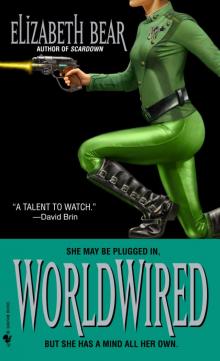 Worldwired
Worldwired Ancestral Night
Ancestral Night Hammered
Hammered The Red Mother
The Red Mother The Red-Stained Wings--The Lotus Kingdoms, Book Two
The Red-Stained Wings--The Lotus Kingdoms, Book Two Machine
Machine Some of the Best from Tor.com: 2019 Edition
Some of the Best from Tor.com: 2019 Edition Faster Gun
Faster Gun In the House of Aryaman, a Lonely Signal Burns
In the House of Aryaman, a Lonely Signal Burns Stone Mad
Stone Mad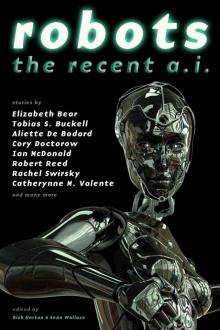 Robots: The Recent A.I.
Robots: The Recent A.I. The Tempering of Men
The Tempering of Men Boojum
Boojum Book of Iron bajc-2
Book of Iron bajc-2 The Year's Best Dark Fantasy and Horror, 2010
The Year's Best Dark Fantasy and Horror, 2010 New Cthulhu 2: More Recent Weird
New Cthulhu 2: More Recent Weird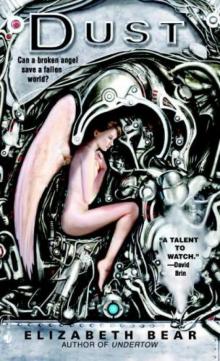 Dust jl-1
Dust jl-1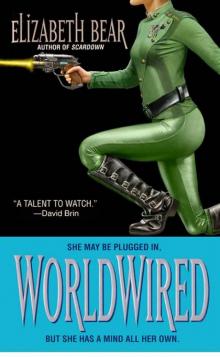 Worldwired jc-3
Worldwired jc-3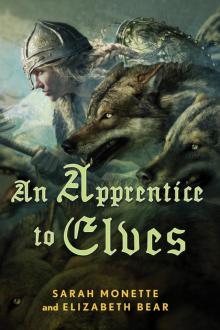 An Apprentice to Elves
An Apprentice to Elves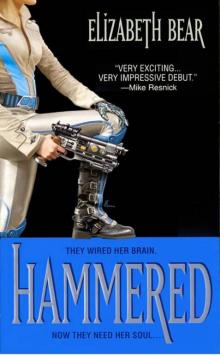 Hammered jc-1
Hammered jc-1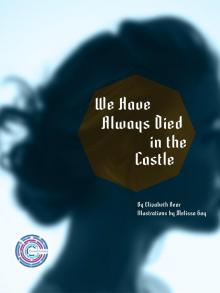 Crowd Futures: We Have Always Died in the Castle
Crowd Futures: We Have Always Died in the Castle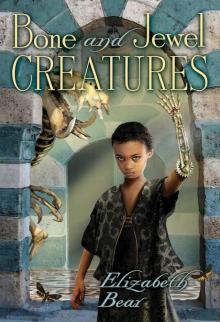 Bone and Jewel Creatures bajc-1
Bone and Jewel Creatures bajc-1 Carnival
Carnival Some of the Best from Tor.com: 2012 Edition: A Tor.Com Original
Some of the Best from Tor.com: 2012 Edition: A Tor.Com Original The Stone in the Skull
The Stone in the Skull Scardown jc-2
Scardown jc-2 Hell and Earth pa-4
Hell and Earth pa-4 Undertow
Undertow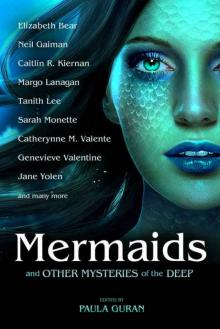 Mermaids and Other Mysteries of the Deep
Mermaids and Other Mysteries of the Deep A Companion to Wolves
A Companion to Wolves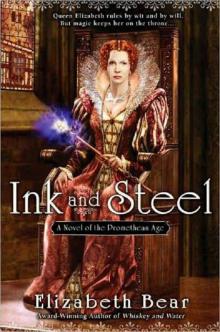 Ink and Steel pa-3
Ink and Steel pa-3